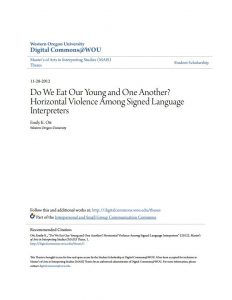Do We Eat Our Young and One Another? Horizontal Violence Among Signed Language Interpreters
Abstract
The aim of this study is to research whether signed language interpreters in Ohio experience intergenerational communication conflict. The initial hypothesis was that interpreters do experience such conflict. The first phase of research was a survey of interpreters in the state of Ohio to determine whether preliminary evidence existed to suggest that new interpreters and more experienced interpreters do experience communication conflict. Such evidence was found. The second phase of research was a process of interviews with two new interpreters and two more experienced interpreters. The data revealed that while there is evidence to support that there is conflict between new and more experienced interpreters, the evidence is perhaps indicative of a larger problem in the field: horizontal violence. Both the survey data and the interview data support the idea that horizontal violence may take place in the interpreting field. Literature from the fields of education and nursing were consulted, since no research has been done about horizontal violence in the field of signed language interpreting. Information from the literature, as well as survey and interview data suggest that while
new interpreters and more experienced interpreters do seem to experience conflict, such conflict is indicative of the larger problem of horizontal violence. Further research about horizontal violence in the field of signed language interpreting is recommended.
Citation:
Ott, Emily K., “Do We Eat Our Young and One Another? Horizontal Violence Among Signed Language Interpreters” (2012). Master’s of Arts in Interpreting Studies (MAIS) Theses. 1.










